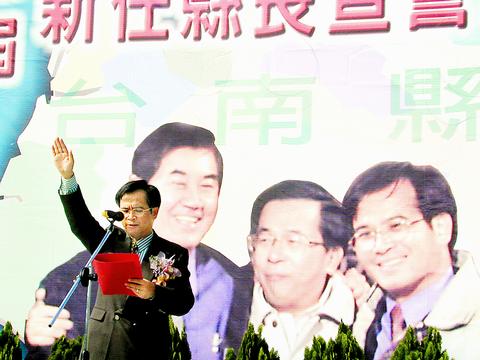The 23 county commissioners and city mayors elected in the Dec. 1 elections took their oaths of office yesterday. And in a sign of difficult times, most promised to boost their local economies.
The handover ceremonies were held under the auspices of the Ministry of the Interior in the requisite counties and cities across the country.
Taoyuan County's new commissioner, Chu Li-lun (朱立倫), said that he would deal with the top three problems he said Taoyuan residents are most concerned about: traffic, security and financial difficulties.

PHOTO: CHEN CHUN-SHENG, TAIPEI TIMES
He said that the Taoyuan County Government will bring more bus-inesses into the county and promised to shorten the application process to obtain permission to build plants in the county.
The new DPP commissioner in Chiayi County, Chen Ming-wen(陳明文), said that since Chiayi is primarily an agricultural region, his government will face tough challenges upgrading the sector to deal with Taiwan's entry into the WTO. He added, however, that "Crisis also means opportunity. I believe that if we cooperate with each other, we will meet the challenges."
The incoming DPP commissioner of Tainan County, Su Huan-chih (蘇煥智), made the same promise in his mainly agricultural county.
Su also promised to establish a biotech park and, like his predecessor Chen Tang-shan (陳唐山), "to bring business from all over Taiwan" into the county.
In Taipei County, re-elected DPP commissioner Su Tseng-chang (蘇貞昌) promised to improve the county's investment environment.
"I will spend every penny appropriately, strengthen the government's administrative efficiency, create more job opportunities and push for greater cooperation between the central and local governments," Su said.
In Miaoli County, independent Commissioner Fu Hseuh-peng (傅學鵬) proposed four goals for Miaoli, including building a university and developing technology, tourism and welfare.
In Hsinchu City, KMT Mayor Lin Cheng-tse (林政則) emphasized his social welfare policy, promising an increase in subsidies for the elderly and women's maternity allowances.
In Taichung City, outgoing mayor Chang Wen-ying (張溫鷹) said she hopes the newly elected mayor, Jason Hu, will help Taichung overtake Kaohsiung and Taipei to become Taiwan's "top city."
The DPP, which controlled 12 districts in 1997, won just nine city and county districts this time around. The KMT, which previously controlled eight counties, was victorious in nine districts.
Independent candidates and the People First Party captured two districts each, while the New Party took only Kinmen County.
Local heads have complained bitterly about their financial plight since the election. Many local government are heavily reliant on loans.
Premier Chang Chun-hsiung (張俊雄) promised at a meeting with all of the newly elected leaders last Sunday that the Cabinet will adopt measures to help them cope with their fiscal woes.
Emotional incidents, however, marred the ceremonies in Taoyuan, Hsinchu and Chiayi.
In Chiayi County, outgoing commissioner Lee Ya-ching (李雅景) failed to attend the handover ceremony for "personal reasons." In Taoyuan County, a county councilor heckled outgoing commissioner Hsu Ying-shen (許應深) during his speech and in Hsinchu County, the newly elected commissioner's supporters implored the outgoing commissioner, Lin Kuang-hua (林光華), to end his speech after he had spoken for over an hour.

CHAOS: Iranians took to the streets playing celebratory music after reports of Khamenei’s death on Saturday, while mourners also gathered in Tehran yesterday Iranian Supreme Leader Ayatollah Ali Khamenei was killed in a major attack on Iran launched by Israel and the US, throwing the future of the Islamic republic into doubt and raising the risk of regional instability. Iranian state television and the state-run IRNA news agency announced the 86-year-old’s death early yesterday. US President Donald Trump said it gave Iranians their “greatest chance” to “take back” their country. The announcements came after a joint US and Israeli aerial bombardment that targeted Iranian military and governmental sites. Trump said the “heavy and pinpoint bombing” would continue through the week or as long

TRUST: The KMT said it respected the US’ timing and considerations, and hoped it would continue to honor its commitments to helping Taiwan bolster its defenses and deterrence US President Donald Trump is delaying a multibillion-dollar arms sale to Taiwan to ensure his visit to Beijing is successful, a New York Times report said. The weapons sales package has stalled in the US Department of State, the report said, citing US officials it did not identify. The White House has told agencies not to push forward ahead of Trump’s meeting with Chinese President Xi Jinping (習近平), it said. The two last month held a phone call to discuss trade and geopolitical flashpoints ahead of the summit. Xi raised the Taiwan issue and urged the US to handle arms sales to

BIG SPENDERS: Foreign investors bought the most Taiwan equities since 2005, signaling confidence that an AI boom would continue to benefit chipmakers Taiwan Semiconductor Manufacturing Co’s (TSMC, 台積電) market capitalization swelled to US$2 trillion for the first time following a 4.25 percent rally in its American depositary receipts (ADR) overnight, putting the world’s biggest contract chipmaker sixth on the list of the world’s biggest companies by market capitalization, just behind Amazon.com Inc. The site CompaniesMarketcap.com ranked TSMC ahead of Saudi Aramco and Meta Platforms Inc. The Taiwanese company’s ADRs on Tuesday surged to US$385.75 on the New York Stock Exchange, as strong demand for artificial intelligence (AI) applications led to chip supply constraints and boost revenue growth to record-breaking levels. Each TSMC ADR represents

State-run CPC Corp, Taiwan (CPC, 台灣中油) yesterday said that it had confirmed on Saturday night with its liquefied natural gas (LNG) and crude oil suppliers that shipments are proceeding as scheduled and that domestic supplies remain unaffected. The CPC yesterday announced the gasoline and diesel prices will rise by NT$0.2 and NT$0.4 per liter, respectively, starting Monday, citing Middle East tensions and blizzards in the eastern United States. CPC also iterated it has been reducing the proportion of crude oil imports from the Middle East and diversifying its supply sources in the past few years in response to geopolitical risks, expanding